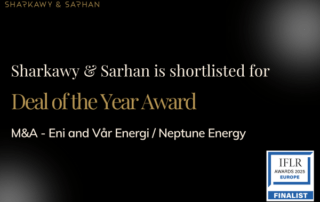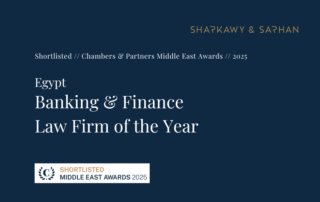8th of June, 2015
Egypt’s Feed-in-Tariffs Program: Briefing on Project Bankability and Finance Aspects
Partner Ahmed El Sharkawy and Senior Associate Mohamed Nabil authored a briefing on the issues/concerns that banks and financial institutions regard as crucial for the bankability of renewable power projects under Egypt’s FiT program, and what are the best mitigation strategies for banks and financial institutions to address those concerns.
On 17 September 2014, the Cabinet of Ministers announced the inauguration of Egypt’s feed-in tariff (FiT) program and invited investors to a pre-qualification submission. A few weeks later, the government released a shortlist of 110 qualified applicants for solar photovoltaic and wind FiT projects.
The off-taker under the FiT program will be either the Egyptian Electricity Transmission Company (EETC) – the country’s bulk power purchaser and sole operator of the grid – or distribution companies (depending on project sizes) pursuant to power purchase agreements of 25 years’ term for photovoltaic facilities and 20 years’ term for wind facilities.
While investors are flocking to gain a foothold in the first FiT regulatory period, banks and financial institutions are carefully observing in anticipation for the final project documentation (including the power purchase agreement – PPA). The released draft of the PPA is based on Egypt’s IPP precedents and the Suez wind farm BOO project. It is currently being reviewed by the qualified investors and the leading financial institutions to address its bankability.
The nature of renewable power projects – with their high upfront capital requirements and low operational costs – further emphasizes the bankability challenge. Hence, it is of paramount importance to highlight to the government the key bankability concerns for banks and financial institutions at these early stages of structuring and drafting in order to ensure that the draft PPA is issued in good shape for negotiation.
To read the full article, click here.
On 17 September 2014, the Cabinet of Ministers announced the inauguration of Egypt’s feed-in tariff (FiT) program and invited investors to a pre-qualification submission. A few weeks later, the government released a shortlist of 110 qualified applicants for solar photovoltaic and wind FiT projects.
The off-taker under the FiT program will be either the Egyptian Electricity Transmission Company (EETC) – the country’s bulk power purchaser and sole operator of the grid – or distribution companies (depending on project sizes) pursuant to power purchase agreements of 25 years’ term for photovoltaic facilities and 20 years’ term for wind facilities.
While investors are flocking to gain a foothold in the first FiT regulatory period, banks and financial institutions are carefully observing in anticipation for the final project documentation (including the power purchase agreement – PPA). The released draft of the PPA is based on Egypt’s IPP precedents and the Suez wind farm BOO project. It is currently being reviewed by the qualified investors and the leading financial institutions to address its bankability.
The nature of renewable power projects – with their high upfront capital requirements and low operational costs – further emphasizes the bankability challenge. Hence, it is of paramount importance to highlight to the government the key bankability concerns for banks and financial institutions at these early stages of structuring and drafting in order to ensure that the draft PPA is issued in good shape for negotiation.
To read the full article, click here.

Egypt’s Feed-in-Tariffs Program: Briefing on Project Bankability and Finance Aspects
8th of June, 2015
Partner Ahmed El Sharkawy and Senior Associate Mohamed Nabil authored a briefing on the issues/concerns that banks and financial institutions regard as crucial for the bankability of renewable power projects under Egypt’s FiT program, and what are the best mitigation strategies for banks and financial institutions to address those concerns.
On 17 September 2014, the Cabinet of Ministers announced the inauguration of Egypt’s feed-in tariff (FiT) program and invited investors to a pre-qualification submission. A few weeks later, the government released a shortlist of 110 qualified applicants for solar photovoltaic and wind FiT projects.
The off-taker under the FiT program will be either the Egyptian Electricity Transmission Company (EETC) – the country’s bulk power purchaser and sole operator of the grid – or distribution companies (depending on project sizes) pursuant to power purchase agreements of 25 years’ term for photovoltaic facilities and 20 years’ term for wind facilities.
While investors are flocking to gain a foothold in the first FiT regulatory period, banks and financial institutions are carefully observing in anticipation for the final project documentation (including the power purchase agreement – PPA). The released draft of the PPA is based on Egypt’s IPP precedents and the Suez wind farm BOO project. It is currently being reviewed by the qualified investors and the leading financial institutions to address its bankability.
The nature of renewable power projects – with their high upfront capital requirements and low operational costs – further emphasizes the bankability challenge. Hence, it is of paramount importance to highlight to the government the key bankability concerns for banks and financial institutions at these early stages of structuring and drafting in order to ensure that the draft PPA is issued in good shape for negotiation.
To read the full article, click here.
On 17 September 2014, the Cabinet of Ministers announced the inauguration of Egypt’s feed-in tariff (FiT) program and invited investors to a pre-qualification submission. A few weeks later, the government released a shortlist of 110 qualified applicants for solar photovoltaic and wind FiT projects.
The off-taker under the FiT program will be either the Egyptian Electricity Transmission Company (EETC) – the country’s bulk power purchaser and sole operator of the grid – or distribution companies (depending on project sizes) pursuant to power purchase agreements of 25 years’ term for photovoltaic facilities and 20 years’ term for wind facilities.
While investors are flocking to gain a foothold in the first FiT regulatory period, banks and financial institutions are carefully observing in anticipation for the final project documentation (including the power purchase agreement – PPA). The released draft of the PPA is based on Egypt’s IPP precedents and the Suez wind farm BOO project. It is currently being reviewed by the qualified investors and the leading financial institutions to address its bankability.
The nature of renewable power projects – with their high upfront capital requirements and low operational costs – further emphasizes the bankability challenge. Hence, it is of paramount importance to highlight to the government the key bankability concerns for banks and financial institutions at these early stages of structuring and drafting in order to ensure that the draft PPA is issued in good shape for negotiation.
To read the full article, click here.
Insights
Disclaimer
The information included in this publication/client alert is not legal advice or any other advice. Publications and client alerts on this site are current as of their date of publication and do not necessarily reflect the present law or regulations. Please feel free to contact us should you need any legal advice related to the publication/client alert. Sharkawy & Sarhan (the “Firm”) will not be held liable for any compensatory, special, direct, incidental, indirect, or consequential damages, exemplary damages or any damages whatsoever arising out of or in connection with the use of the data, information or material included in this publication/client alert. This publication/client alert may contain links to third-party websites that are not controlled by the Firm. These third-party links are made available to you as a convenience and you agree to use these links at your own risk. Please be aware that the Firm is not responsible for the content or services offered by and of third-party websites, links as included in the Newsletter nor are we responsible for the privacy policy or practices of third-party websites links included therein.
Authorization of Use
The data, information, and material included in this publication/client alert are solely owned by the Firm. All rights related are reserved under the laws of the Arab Republic of Egypt. No part of this publication/client alert can be redistributed, copied, or reproduced without the prior written consent of the Firm.








